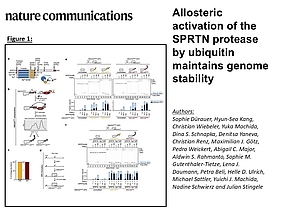New joint publication by the Stingele, Ulrich and Beli labs on how allosteric activation of the SPRTN protease by ubiquitin maintains genome stability
Dürauer S, Kang HS, Wiebeler C, Machida Y, Schnapka DS, Yaneva D, Renz C, Götz MJ, Weickert P, Major AC, Rahmanto AS, Gutenthaler-Tietze SM, Daumann LJ, Beli P, Ulrich HD, Sattler M, Machida YJ, Schwierz N, Stingele J (2025) Allosteric activation of the SPRTN protease by ubiquitin maintains genome stability. Nat Commun, 16(1):5422 Link
Abstract:
The DNA-dependent protease SPRTN maintains genome stability by degrading toxic DNA-protein crosslinks (DPCs). To understand how SPRTN’s promiscuous protease activity is confined to cleavage of crosslinked proteins, we reconstitute the repair of DPCs including their modification with SUMO and ubiquitin chains in vitro. We discover that DPC ubiquitylation strongly activates SPRTN independently of SPRTN’s known ubiquitin-binding domains. Using protein structure prediction, MD simulations and NMR spectroscopy we reveal that ubiquitin binds to SPRTN’s protease domain, promoting an open, active conformation. Replacing key interfacial residues prevents allosteric activation of SPRTN by ubiquitin, leading to genomic instability and cell cycle defects in cells expressing truncated SPRTN variants that cause premature aging and liver cancer in Ruijs-Aalfs syndrome patients. Collectively, our results reveal a ubiquitin-dependent regulatory mechanism that ensures SPRTN activity is deployed precisely when and where it is needed.
Read the full paper here: https://www.nature.com/articles/s41467-025-61224-z

